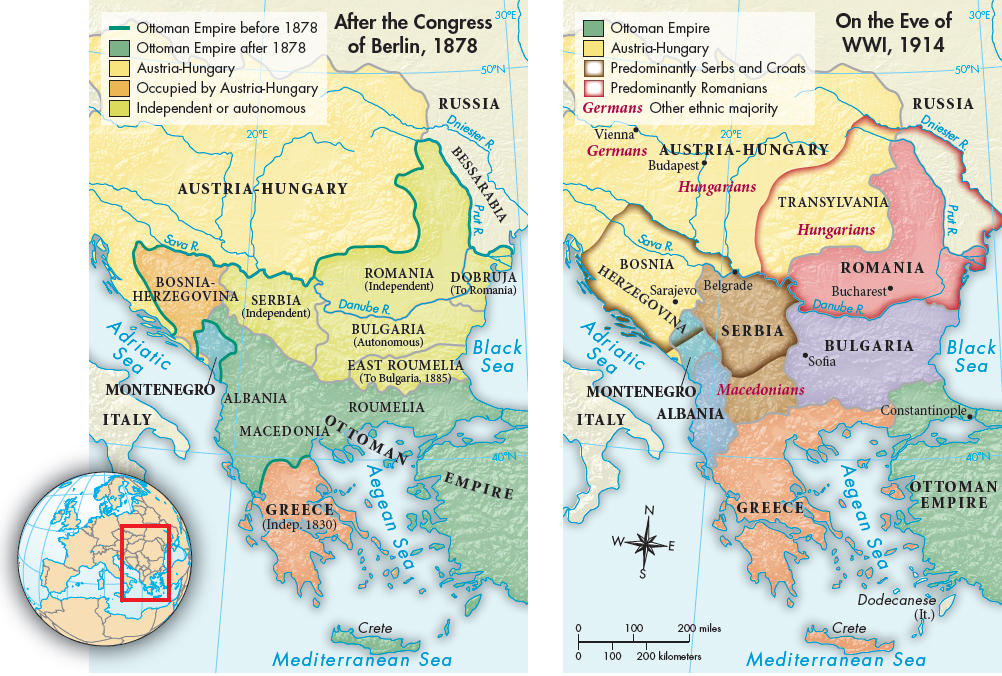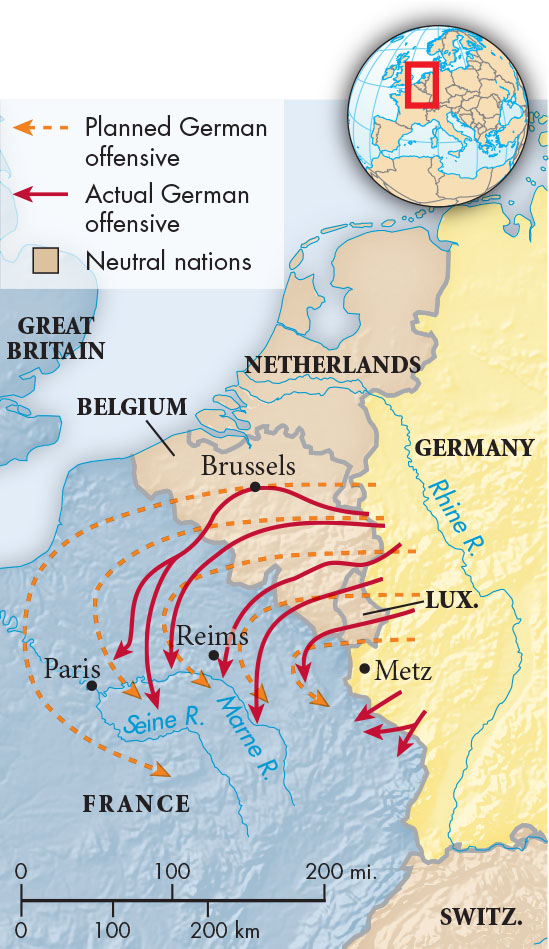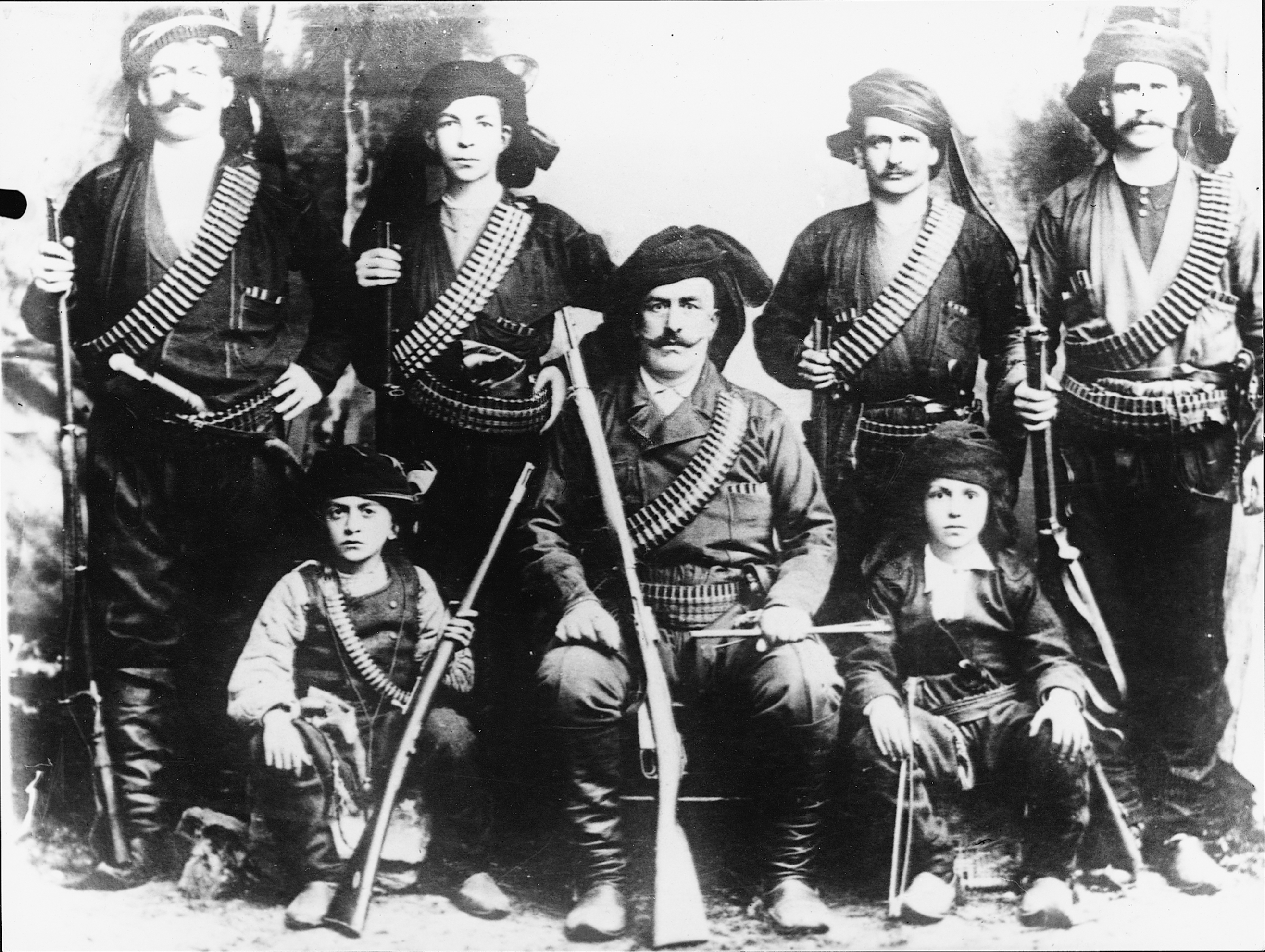The Outbreak of War
In 1897, the year before he died, the prescient Bismarck is reported to have remarked, “One day the great European War will come out of some damned foolish thing in the Balkans.”2 By the early twentieth century a Balkans war seemed inevitable. The reason was simple: nationalism was destroying the Ottoman Empire in Europe and threatening to break up the Austro-Hungarian Empire. The 1878 Treaty of Berlin had forced the Ottoman Empire to cede most of its European territory, but it retained important Balkan holdings.
By 1903 Balkan nationalism was asserting itself again. Serbia led the way, becoming openly hostile to both Austria-Hungary and the Ottoman Empire. The Slavic Serbs looked to Slavic Russia for support of their national aspirations. In 1908, to block Serbian expansion, Austria formally annexed Bosnia and Herzegovina, with their large Serbian, Croatian, and Muslim populations. Serbia erupted in rage but could do nothing without Russia’s support.
Then two nationalist wars, the first and second Balkan wars in 1912 and 1913, finally destroyed the centuries-long Ottoman presence in Europe (Map 28.2). This sudden but long-expected event elated Balkan nationalists but dismayed Austria-Hungary’s leaders, who feared that Austria-Hungary might next be broken apart.

MAP 28.2 The Balkans, 1878–1914 The Ottoman Empire suffered large territorial losses after the Congress of Berlin in 1878 but remained a power in the Balkans. By 1914 ethnic boundaries that did not follow political boundaries had formed, and Serbian national aspirations threatened Austria-Hungary.

The Schlieffen Plan
Within this tense context, Serbian nationalist Gavrilo Princip assassinated Archduke Franz Ferdinand, heir to the Austro-Hungarian throne, and his wife, Sophie, on June 28, 1914, during a state visit to the Bosnian capital of Sarajevo. Austria-Hungary’s leaders held Serbia responsible and on July 23 presented Serbia with an unconditional ultimatum that included demands amounting to Austrian control of the Serbian state. When Serbia replied moderately but evasively, Austria began to mobilize and declared war on Serbia on July 28.
Of prime importance in Austria-Hungary’s fateful decision was Germany’s unconditional support. Kaiser William II and his chancellor, Theobald von Bethmann-Hollweg, realized that war between Austria and Russia was likely, for Russia could not stand by and watch the Serbs be crushed. Yet Bethmann-Hollweg hoped that while Russia (and its ally France) might go to war, Great Britain would remain neutral.

Nationalist Opposition in the Balkans This band of well-armed and determined guerrillas from northern Albania was typical of groups fighting against Ottoman rule in the Balkans. Balkan nationalists succeeded in driving the Ottoman Turks out of most of Europe, but their victory increased tensions with Austria-Hungary and among the Great Powers. (Photo by Albert Harlingue/Roger-Viollet Collection/Getty Images)
Anticipating a possible conflict, Europe’s military leaders had been drawing up comprehensive war plans and timetables for years, and now these, rather than diplomacy, began to dictate policy. On July 28, as Austrian armies bombarded Belgrade, Tsar Nicholas II ordered a partial mobilization against Austria-Hungary but almost immediately found this was impossible. Russia had assumed a war with both Austria and Germany, and it could not mobilize against one without mobilizing against the other. Therefore, on July 29 Russia ordered full mobilization and in effect declared general war. The German general staff had also prepared for a two-front war. Its Schlieffen plan, first drafted in 1905, called for first knocking out France with a lightning attack through neutral Belgium to capture Paris before turning on a slower-to-mobilize Russia. On August 3 German armies invaded Belgium. Great Britain declared war on Germany the following day. In each country the great majority of the population rallied to defend its nation and enthusiastically embraced war in August 1914.


